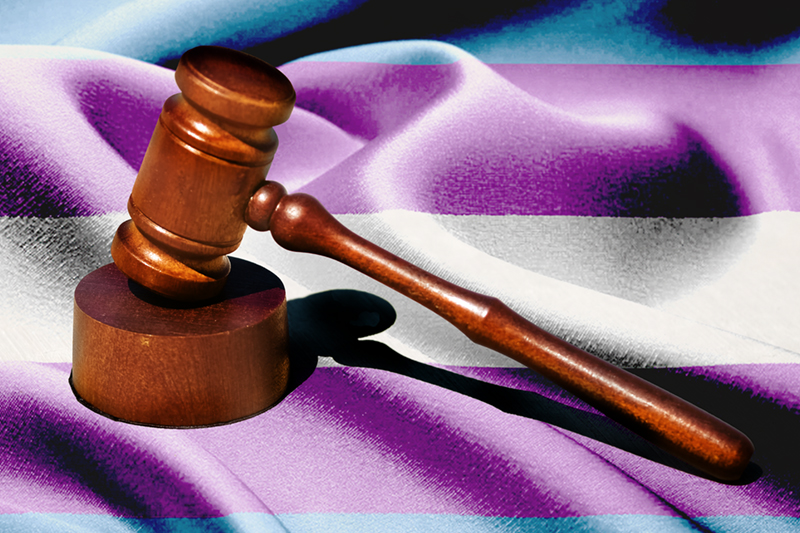Democrats in Congress Seek to Ban LGBTQ “Panic” Defenses
Bill would ban those charged with federal crimes from arguing that their acts of violence were justified by a victim's LGBTQ identity.

A pair of congressional Democrats have introduced a bill to ban the use of gay and transgender “panic” defenses in federal courts.
The LGBTQ+ Panic Defense Prohibition Act, sponsored by openly gay U.S. Rep. Chris Pappas (D-N.H.) in the House of Representatives and U.S. Sen. Ed Markey (D-Mass.) in the Senate, seeks to prevent defendants charged with serious federal crimes, including murder and assault, as well as hate crime charges, from claiming they were so “panicked” by a victim’s LGBTQ identity that they were unable to control their actions.
Such defenses are typically used, in conjunction with other strategies, such as claiming “temporary insanity” or self-defense, to argue that a defendant should not be held responsible for their actions, or should be granted leniency in prosecution or sentencing. LGBTQ advocates argue that such tactics effectively blame LGBTQ victims for their own deaths or injuries and seek to rationalize away the harm that was inflicted upon them.
“No one should be a second-class citizen in the United States, but in many jurisdictions throughout the United States, including our federal courts, violent perpetrators can attempt to avoid accountability for their crimes through the use of bigoted ‘panic’ defenses,” Pappas said in a statement. “No one’s sexual orientation or gender identity is a defense for assault or murder, and it is time Congress follows the lead of states that have already banned this defense in their courts.”
Pappas also acknowledged that a bipartisan coalition of lawmakers in his home state of New Hampshire recently passed a similar law prohibiting the use of “panic” defenses in state courts, and indicated he was open to working in a similar fashion with Republican lawmakers in Congress to pass his bill, which will require at least some GOP support in order to pass.
It remains to be seen whether New Hampshire Gov. Chris Sununu (R) will sign the ban on the “panic” defense into law.
“Members of the LGBTQ+ community, particularly trans people of color, are facing ongoing, escalating, and intensifying violence emboldened by hateful actions and speech by elected officials at every level of government,” Markey said in a statement. “This so-called defense is not only antiquated, but actively legitimizes violence against the LGBTQ+ community and encourages homophobic and transphobic bigotry within our legal system.
“The LGBTQ+ Panic Defense Prohibition Act will stop courts from sanctioning violence against people based on who they are and who they love,” added Markey. “It is a necessary step forward — LGBTQ+ people deserve to be treated with dignity and respect.”
Gay or trans panic defenses have traditionally been employed to argue for a lesser sentence or more leniency by playing on the anti-LGBTQ prejudices of judges or juries, especially in cases where the victim was a gay man or a transgender woman.
In such cases, lawyers for the defendants often argue that their clients were so emotionally upset, panicked, or temporarily enraged over the prospect of an LGBTQ person being attracted to them, or the societal humiliation or rejection that could follow from such a revelation, that they were unable to control their actions and lashed out violently.
Such tactics were employed — both successfully and unsuccessfully — in a number of high-profile cases involving LGBTQ murder victims, including Matthew Shepard, Brandon Teena, Marco McMillan, Gwen Araujo, Angie Zapata, and Islan Nettles.
The defense was also used, in one of the more high-profile murder cases of 1995, by Jonathan Schmitz, to argue for a leniency after he killed a former acquaintance, Scott Amedure, days after Amedure admitted, during the filming of an episode of The Jenny Jones Show focusing on “secret crushes,” that he was attracted to him. Schmitz’s lawyers subsequently argued that he became mentally ill and emotionally unstable after being embarrassed on national TV. Schmitz was ultimately convicted of second-degree murder but was able to avoid a first-degree murder charge.
Currently, 15 states ban the use of gay or trans “panic” defenses in state courts. While opponents of such bans have argued that such laws are unnecessary, criminal justice professor Carsten Andresen told The Appeal in a 2021 interview that he had found over 200 cases using such defenses over the past 50 years, and suspects that such arguments may have been employed, in conjunction with other defense tactics, in hundreds of other cases.
Support Metro Weekly’s Journalism
These are challenging times for news organizations. And yet it’s crucial we stay active and provide vital resources and information to both our local readers and the world. So won’t you please take a moment and consider supporting Metro Weekly with a membership? For as little as $5 a month, you can help ensure Metro Weekly magazine and MetroWeekly.com remain free, viable resources as we provide the best, most diverse, culturally-resonant LGBTQ coverage in both the D.C. region and around the world. Memberships come with exclusive perks and discounts, your own personal digital delivery of each week’s magazine (and an archive), access to our Member's Lounge when it launches this fall, and exclusive members-only items like Metro Weekly Membership Mugs and Tote Bags! Check out all our membership levels here and please join us today!


























You must be logged in to post a comment.